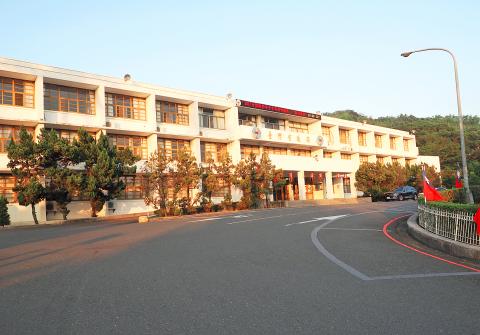Provincial-level agencies will no longer be funded from next year, Executive Yuan deputy spokesman Ting Yun-kung (丁允恭) confirmed yesterday, quoting Premier William Lai (賴清德).
The three agencies are the Fujian Provincial Government, the Taiwan Provincial Government and the Taiwan Provincial Consultative Council.
To better utilize the nation’s resources and improve administrative effectiveness, funding for the three agencies is to be stopped, Lai was quoted as saying.

Photo: Chen Fong-li, Taipei Times
The agencies’ employees and tasks are to be reassigned to the National Development Council and several government ministries from Sunday, he said.
Although there would no longer be any provincial-level tasks next year, there would still be a Taiwan Provincial governor and a Taiwan Provincial Consultative Council chairperson, because the agencies are required by the Constitution and cannot be abolished, Executive Yuan spokesman Hsu Kuo-yung (徐國勇) said.
The Cabinet would assign the position of governor to a minister without portfolio, who would not receive an additional salary for the role, Hsu said, adding that the council would be responsible for maintaining the Taiwan Provincial Government’s buildings.
Nantou County’s Jhongsing New Village (中興新村) — where the Taiwan Provincial Government is based — is well-equipped with various facilities and convenient transportation, Lai said.
After the streamlining of the Taiwan Provincial Government, many people expressed the hope that the central government would reinvigorate the village, because it had not been put to good use, with some parts even left unused, Lai said.
The council is next month to establish an office tasked with reinvigorating the village, Lai said, adding that he has also asked the Directorate-General of Personnel Administration look at transferring Cabinet employees to the area.
The Executive Yuan’s announcement reaffirmed remarks by Taiwan Provincial Governor Wu Tze-cheng (吳澤成) last month at a committee meeting at the Legislative Yuan.
While the Cabinet has not specified how much the government would save from cutting funding to the three agencies, New Power Party Legislator Freddy Lim (林昶佐) in March said it would save NT$300 million (US$9.81 million) per year, citing his own investigation.
Additional reporting by Sean Lin

CHAOS: Iranians took to the streets playing celebratory music after reports of Khamenei’s death on Saturday, while mourners also gathered in Tehran yesterday Iranian Supreme Leader Ayatollah Ali Khamenei was killed in a major attack on Iran launched by Israel and the US, throwing the future of the Islamic republic into doubt and raising the risk of regional instability. Iranian state television and the state-run IRNA news agency announced the 86-year-old’s death early yesterday. US President Donald Trump said it gave Iranians their “greatest chance” to “take back” their country. The announcements came after a joint US and Israeli aerial bombardment that targeted Iranian military and governmental sites. Trump said the “heavy and pinpoint bombing” would continue through the week or as long

TRUST: The KMT said it respected the US’ timing and considerations, and hoped it would continue to honor its commitments to helping Taiwan bolster its defenses and deterrence US President Donald Trump is delaying a multibillion-dollar arms sale to Taiwan to ensure his visit to Beijing is successful, a New York Times report said. The weapons sales package has stalled in the US Department of State, the report said, citing US officials it did not identify. The White House has told agencies not to push forward ahead of Trump’s meeting with Chinese President Xi Jinping (習近平), it said. The two last month held a phone call to discuss trade and geopolitical flashpoints ahead of the summit. Xi raised the Taiwan issue and urged the US to handle arms sales to

BIG SPENDERS: Foreign investors bought the most Taiwan equities since 2005, signaling confidence that an AI boom would continue to benefit chipmakers Taiwan Semiconductor Manufacturing Co’s (TSMC, 台積電) market capitalization swelled to US$2 trillion for the first time following a 4.25 percent rally in its American depositary receipts (ADR) overnight, putting the world’s biggest contract chipmaker sixth on the list of the world’s biggest companies by market capitalization, just behind Amazon.com Inc. The site CompaniesMarketcap.com ranked TSMC ahead of Saudi Aramco and Meta Platforms Inc. The Taiwanese company’s ADRs on Tuesday surged to US$385.75 on the New York Stock Exchange, as strong demand for artificial intelligence (AI) applications led to chip supply constraints and boost revenue growth to record-breaking levels. Each TSMC ADR represents

State-run CPC Corp, Taiwan (CPC, 台灣中油) yesterday said that it had confirmed on Saturday night with its liquefied natural gas (LNG) and crude oil suppliers that shipments are proceeding as scheduled and that domestic supplies remain unaffected. The CPC yesterday announced the gasoline and diesel prices will rise by NT$0.2 and NT$0.4 per liter, respectively, starting Monday, citing Middle East tensions and blizzards in the eastern United States. CPC also iterated it has been reducing the proportion of crude oil imports from the Middle East and diversifying its supply sources in the past few years in response to geopolitical risks, expanding